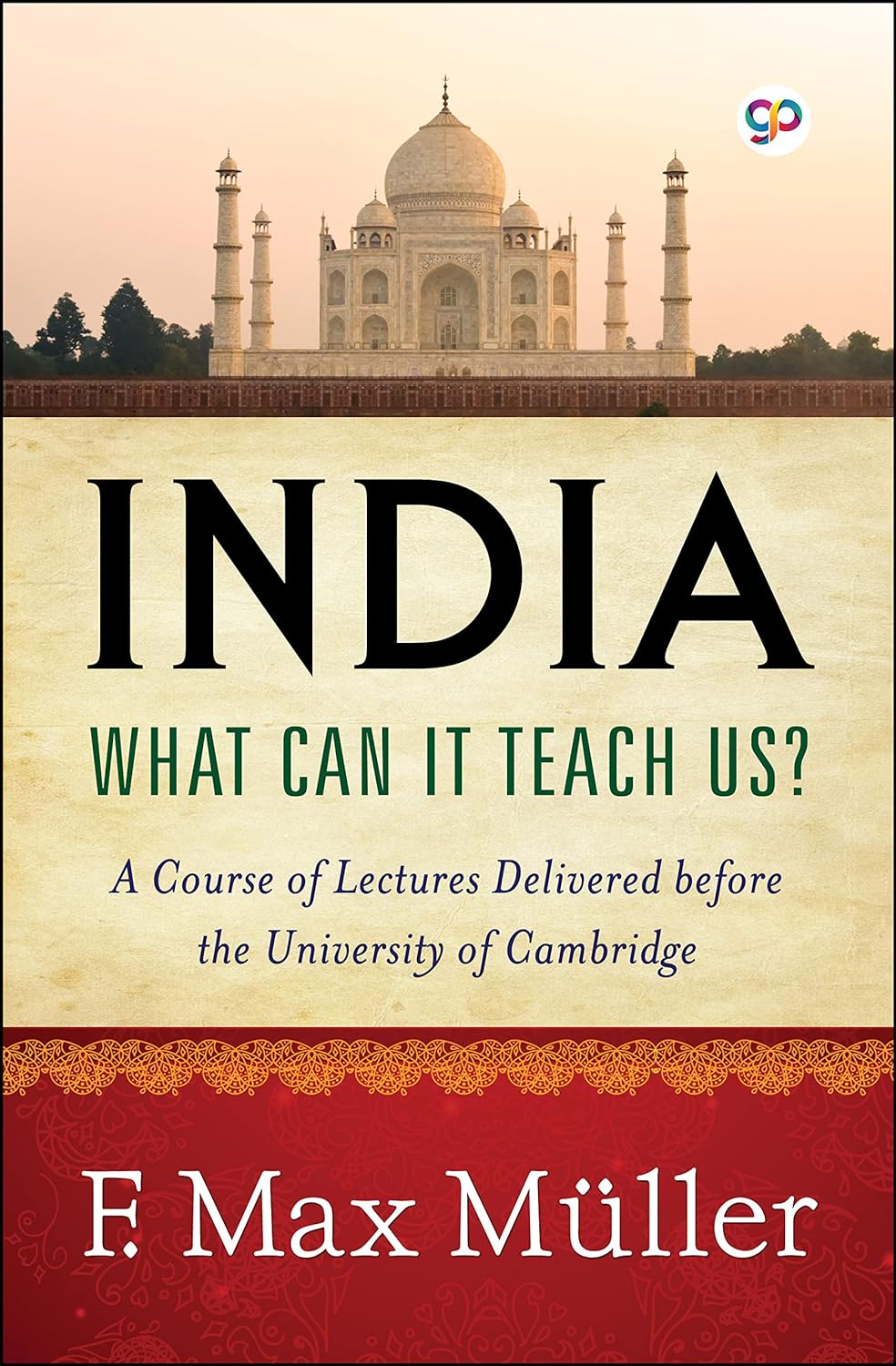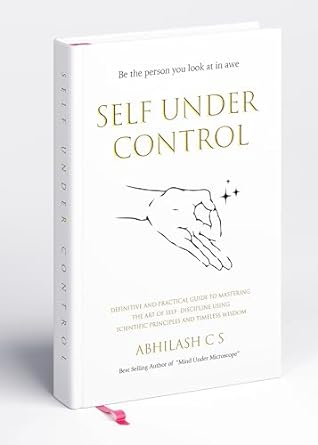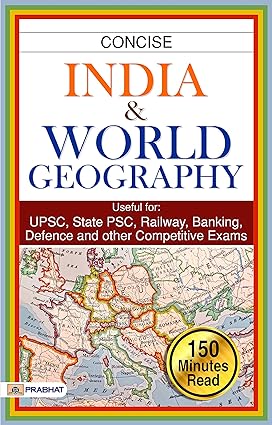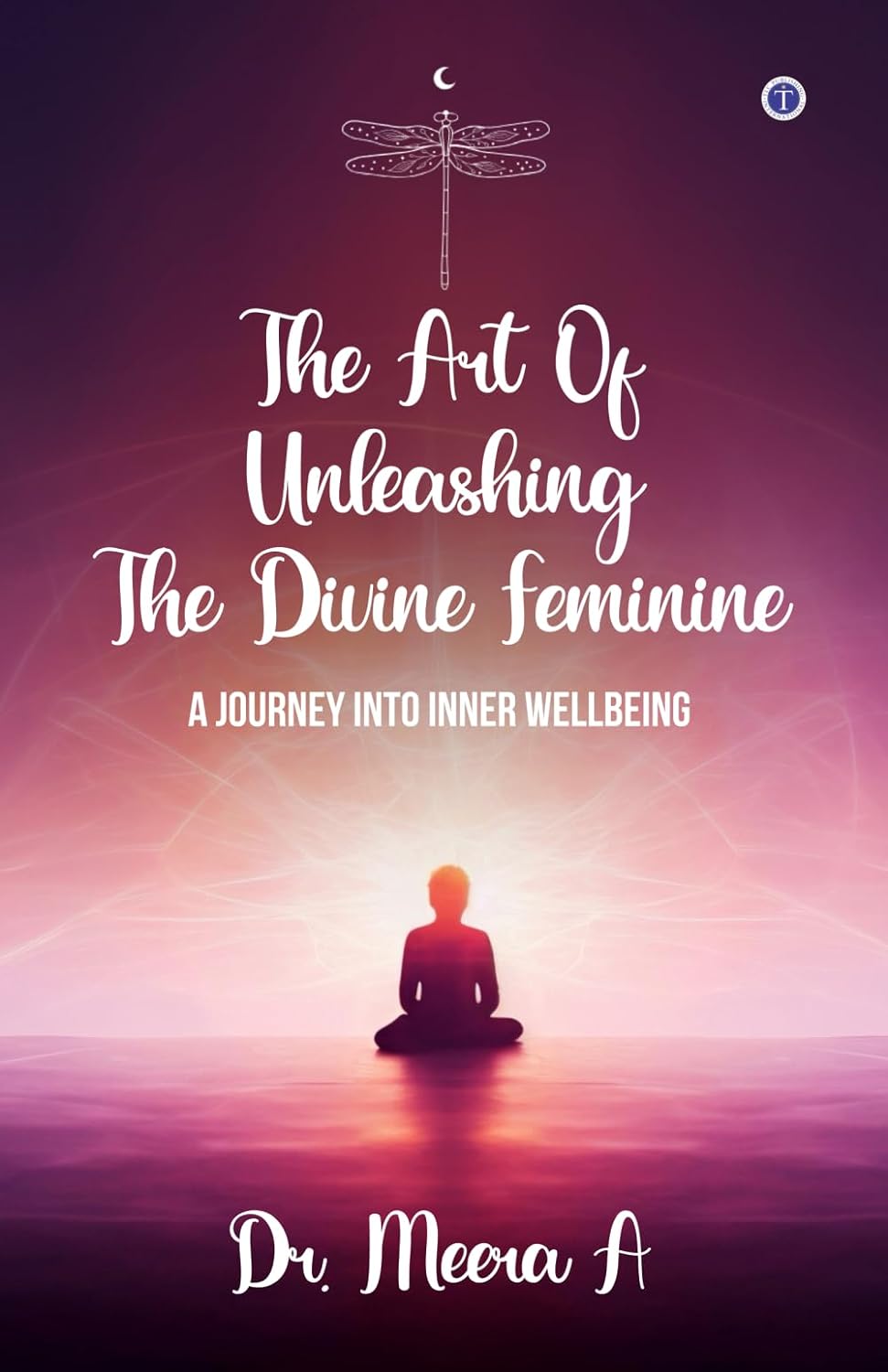
India: What can it teach us?
First published in 1882, ‘India: What can it teach us?’ by F. Max Müller, a German-born philologist, and Orientalist, who lived and studied in Britain for most of his life. He was one of the founders of the western academic disciplines of Indian studies and religious studies. This is the kind of book that should be in the possession of all Indians and India-lovers, travelers to India, or those wanting to understand this ancient and mystical land. F. Max Müller, one of the foremost foreign scholars who ever worked on Indic studies—"If I were to look over the whole world to find out the country most richly endowed with all the wealth, power, and beauty that nature can bestow—in some parts a very paradise on earth—I should point to India.” “If I were asked under what sky the human mind has most fully developed some of its choicest gifts, has most deeply pondered on the greatest problems of life, and has found solutions of some of them which well deserve the attention even of those who have studied Plato and Kant—I should point to India."
BEST DEALS
About the Author
Friedrich Max Muller (1823 - 1900), generally known as Max Muller, was a German-born philologist and Orientalist, who lived and studied in Britain for most of his life. He was one of the founders of the western academic field of Indian studies and the discipline of comparative religion. He was Oxford's first Professor of Comparative Philology, founded on his behalf. Müller wrote both scholarly and popular works on the subject of Indology and the Sacred Books of the East, a 50-volume set of English translations, was prepared under his direction.
Read Sample
Lecture 1 : What can India Teach us?
When I received from the Board of Historical Studies at Cambridge the invitation to deliver a course of lectures, specially intended for the candidates for the Indian Civil Service, I hesitated for some time, feeling extremely doubtful whether in a few public discourses I could say anything that would be of real use to them in passing their examinations. To enable young men to pass their examinations seems now to have become the chief, if not the only object of the universities; and to no class of students is it of greater importance to pass their examinations, and to pass them well, than to the candidates for the Indian Civil Service.
But although I was afraid that attendance on a few public lectures, such as I could give, would hardly benefit a candidate who was not already fully prepared to pass through the fiery ordeal of the three London examinations, I could not on the other hand shut my eyes completely to the fact that, after all, universities were not meant entirely, or even chiefly, as stepping-stones to an examination, but that there is something else which universities can teach and ought to teach – nay, which I feel quite sure they were originally meant to teach – something that may not have a marketable value before a Board of Examiners, but which has a permanent value for the whole of our life, and that is a real interest in our work, and, more than that, a love of our work, and, more than that, a true joy and happiness in our work. If a university can teach that, if it can engraft that one small living germ in the minds of the young men who come here to study and to prepare themselves for the battle of life, and, for what is still more difficult to encounter, the daily dull drudgery of life, then, I feel convinced, a university has done more, and conferred a more lasting benefit on its pupils than by helping them to pass the most difficult examinations, and to take the highest place among Senior Wranglers or First-Class men.
Unfortunately, that kind of work which is now required for passing one examination after another, that process of cramming and crowding which has of late been brought to the highest pitch of perfection, has often the very opposite effect, and instead of exciting an appetite for work, it is apt to produce an indifference, if not a kind of intellectual nausea, that may last for life.
And nowhere is this so much to be feared as in the case of candidates for the Indian Civil Service. After they have passed their first examination for admission to the Indian Civil Service, and given proof that they have received the benefits of a liberal education, and acquired that general information in classics, history, and mathematics, which is provided at our public schools, and forms no doubt the best and surest foundation for all more special and professional studies in later life, they suddenly find themselves torn away from their old studies and their old friends, and compelled to take up new subjects which to many of them seem strange, outlandish, if not repulsive. Strange alphabets, strange languages, strange names, strange literatures and laws have to be faced, “to be got up” as it is called, not from choice, but from dire necessity. The whole course of study during two years is determined for them, the subjects fixed, the books prescribed, the examinations regulated, and there is no time to look either right or left, if a candidate wishes to make sure of taking each successive fence in good style, and without an accident.
I know quite well that this cannot be helped. I am not speaking against the system of examinations in general, if only they are intelligently conducted; nay, as an old examiner myself, I feel bound to say that the amount of knowledge produced ready-made at these examinations is to my mind perfectly astounding. But while the answers are there on paper, strings of dates, lists of royal names and battles, irregular verbs, statistical figures and whatever else you like, how seldom do we find that the heart of the candidates is in the work which they have to do. The results produced are certainly most ample and voluminous, but they rarely contain a spark of original thought, or even a clever mistake. It is work done from necessity, or, let us is just, from a sense of duty, but it is seldom, or hardly ever, a labor of love.
Now why should that be? Why should a study of Greek or Latin – of the poetry, the philosophy, the laws and the art of Greece and Italy – seem congenial to us, why should it excite even a certain enthusiasm, and command general respect, while a study of Sanskrit, and of the ancient poetry, the philosophy, the laws, and the art of India is looked upon, in the best case, as curious, but is considered by most people as useless, tedious, if not absurd?
And, strange to say, this feeling exists in England more than in any other country. In France, Germany, and Italy, even in Denmark, Sweden, and Russia, there is a vague charm connected with the name of India. One of the most beautiful poems in the German language is the Weisheit der Brahmanen, the “Wisdom of the Brahmans,” by Rückert, to my mind more rich in thought and more perfect in form than even Goethe’s West-östlicher Divan. A scholar who studies Sanskrit in Germany is supposed to be initiated in the deep and dark mysteries of ancient wisdom, and a man who has travelled in India, even if he has only discovered Calcutta, or Bombay, or Madras, is listened to like another Marco Polo. In England a student of Sanskrit is generally considered a bore, and an old Indian civil servant, if he begins to describe the marvels of Elephanta or the Towers of Silence, runs the risk of producing a count-out.
There are indeed a few Oriental scholars whose works are read, and who have acquired a certain celebrity in England, because they were really men of uncommon genius, and would have ranked among the great glories of the country, but for the misfortune that their energies were devoted to Indian literature – I mean Sir William Jones, “one of the most enlightened of the sons of men,” as Dr. Johnson called him, and Thomas Colebrooke. But the names of others who have done good work in their day also, men such as Ballantyne, Buchanan, Carey, Crawfurd, Davis, Elliot, Ellis, Houghton, Leyden, Mackenzie, Marsden, Muir, Prinsep, Rennell, Turnour, Upham, Wallich, Warren, Wilkins, Wilson, and many others, are hardly known beyond the small circle of Oriental scholars; and their works are looked for in vain in libraries which profess to represent with acertain completeness the principal branches of scholarship and science in England.
How many times, when I advised young men, candidates for the Indian Civil Service, to devote themselves before all things to a study of Sanskrit, have I been told, “What is the use of our studying Sanskrit? There are translations of Sakuntalâ, Manu, and the Hitopadesa, and what else is there in that literature that is worth reading? Kâlidâsa may be very pretty, and the Laws of Manu are very curious, and the fables of the Hitopadesa are very quaint; but you would not compare Sanskrit literature with Greek, or recommend us to waste our time in copying and editing Sanskrit texts which either teach us nothing that we do not know already, or teach us something which we do not care to know?”
This seems to me a most unhappy misconception, and it will be the chief object of my lectures to try to remove it, or at all events to modify it, as much as possible. I shall not attempt to prove that Sanskrit literature is as good as Greek literature. Why should we always compare? A study of Greek literature has its own purpose, and a study of Sanskrit literature has its own purpose; but what I feel convinced of, and hope to convince you of, is that Sanskrit literature, if studied only in a right spirit, is full of human interests, full of lessons which even Greek could never teach us, a subject worthy to occupy the leisure, and more than the leisure, of every Indian civil servant; and certainly the best means of making any young man who has to spend five-and-twenty years of his life in India, feel at home among the Indians, as a fellow-worker among fellow-workers, and not as an alien among aliens. There will be abundance of useful and most interesting work for him to do, if only he cares to do it, work such as he would look for in vain, whether in Italy or in Greece, or even among the pyramids of Egypt or the palaces of Babylon.
You will now understand why I have chosen as the title of my lectures, “What can India teach us?” True, there are many things which India has to learn from us; but there are other things, and, in one sense, very important things, which we too may learn from India.
If I were to look over the whole world to find out the country most richly endowed with all the wealth, power, and beauty that nature can bestow – in some parts a very paradise on earth – I should point to India. If I were asked under what sky the human mind has most full developed some of its choicest gifts, has most deeply pondered on the greatest problems of life, and has found solutions of some of them which well deserve the attention even of those who have studied Plato and Kant – I should point to India. And if I were to ask myself from what literature we, here in Europe, we who have been nurtured almost exclusively on the thoughts of Greeks and Romans, and of one Semitic race, the Jewish, may draw that corrective which is most wanted in order to make our inner life more perfect, more comprehensive, more universal, in fact more truly human, a life, not for this life only, but a transfigured and eternal life – again I should point to India.
I know you will be surprised to hear me say this. I know that more particularly those who have spent many years of active life in Calcutta, or Bombay, or Madras, will be horror-struck at the idea that the humanity they meet with there, whether in the bazaars or in the courts of justice, or in so-called native society, should be able to teach us any lessons.
Let me therefore explain at once to my friends who may have lived in India for years, as civil servants, or officers, or missionaries, or merchants, and who ought to know a great deal more of that country than one who has never set foot on the soil of Âryâvarta, that we are speaking of two very different Indias. I am thinking chiefly of India such as it was a thousand, two thousand, it may be three thousand years ago; they think of the India of to-day. And again, when thinking of the India of to-day, they remember chiefly the India of Calcutta, Bombay, or Madras, the India of the towns. I look to the India of the village communities, the true India of the Indians.
What I wish to show to you, I mean more especially the candidates for the Indian Civil Service, is that this India of a thousand, or two thousand, or three thousand years ago, ay the India of to-day also, if only you know where to look for it, is full of problems, the solution of which concerns all of us, even us in this Europe of the nineteenth century.
If you have acquired any special tastes here in England, you will find plenty to satisfy them in India; and whoever has learned to take an interest in any of the great problems that occupy the best thinkers and workers at home, need certainly not be afraid of India proving to him an intellectual exile.
If you care for geology, there is work for you from the Himalayas to Ceylon.
If you are fond of botany, there is a flora rich enough for many Hookers.
If you are a zoologist, think of Haeckel, who is just now rushing through Indian forests and dredging in Indian seas, and to whom his stay in India is like the realization of the brightest dream of his life.
If you are interested in ethnology, why India is like a living ethnological museum.
If you are fond of archæology, if you have ever assisted at the opening of a barrow in England, and know the delight of finding a fibula, or a knife, or a flint in a heap of rubbish, read only General Cunningham’s “Annual Reports of the Archæological Survey of India,” and you will be impatient for the time when you can take your spade and bring to light the ancient Vihâras or colleges built by the Buddhist monarchs of India.
If ever you amused yourselves with collecting coins, why the soil of India teems with coins, Persian, Carian, Thracian, Parthian, Greek, Macedonian, Scythian, Roman, and Mohammedan. When Warren Hastings was Governor-General, an earthen pot was found on the bank of a river in the province of Benares, containing one hundred and seventy-two gold darics. Warren Hastings considered himself as making the most munificent present to his masters that he might ever have it in his power to send them, by presenting those ancient coins to the Court of Directors. The story is that they were sent to the melting-pot. At all events they had disappeared when Warren Hastings returned to England. It rests with you to prevent the revival of such vandalism.
In one of the last numbers of the Asiatic Journal of Bengal you may read of the discovery of a treasure as rich in gold almost as some of the tombs opened by Dr. Schliemann at Mykenæ, nay, I should add, perhaps, not quite unconnected with some of the treasures found at Mykenæ; yet hardly anyone has taken notice of it in England!
The study of Mythology has assumed an entirely new character, chiefly owing to the light that has been thrown on it by the ancient Vedic Mythology of India. But though the foundation of a true Science of Mythology has been laid, all the detail has still to be worked out, and could be worked out nowhere better than in India.
Even the study of fables owes its new life to India, from whence the various migrations of fables have been traced at various times and through various channels from East to West. Buddhism is now known to have been the principal source of our legends and parables. But here, too, many problems still wait for their solution. Think, for instance, of the allusion to the fable of the donkey in the lion’s skin, which occurs in Plato’s Cratylus. Was that borrowed from the East? Or take the fable of the weasel changed by Aphroditê into a woman who, when she saw a mouse, could not refrain from making a spring at it. This, too, is very like a Sanskrit fable; but how then could it have been brought into Greece early enough to appear in one of the comedies of Strattis, about 400 B.C.? Here, too, there is still plenty of work to do.
We may go back even farther into antiquity, and still find strange coincidences between the legends of India and the legends of the West, without as yet being able to say how they travelled, whether from East to West, or from West to East. That at the time of Solomon there was a channel of communication open between India and Syria and Palestine is established beyond doubt, I believe, by certain Sanskrit words which occur in the Bible as names of articles of export from Ophir, articles such as ivory, apes, peacocks, and sandalwood, which, taken together, could not have been exported from any country but India. Nor is there any reason to suppose that the commercial intercourse between India, the Persian Gulf, the Red Sea and the Mediterranean was ever completely interrupted, even at the time when the Book of Kings is supposed to have been written.
Now you remember the judgment of Solomon, which has always been admired as a proof of great legal wisdom among the Jews. I must confess that, not having a legal mind, I never could suppress a certain shudder when reading the decision of Solomon: “Divide the living child in two, and give half to the one, and half to the other.”
Let me now tell you the same story as it is told by the Buddhists, whose sacred Canon is full of such legends and parables. In the Kanjur, which is the Tibetan translation of the Buddhist Tripitaka, we likewise read of two women who claimed each to be the mother of the same child. The king, after listening to their quarrels for a long time, gave it up as hopeless to settle who was the real mother. Upon this Visâkhâ stepped forward and said: “What is the use of examining and cross-examining these women? Let them take the boy and settle it among themselves.” Thereupon both women fell on the child, and when the fight became violent the child was hurt and began to cry. Then one of them let him go, because she could not bear to hear the child cry.
That settled the question. The king gave the child to the true mother, and had the other beaten with a rod.
This seems to me, if not the more primitive, yet the more natural form of the story – showing a deeper knowledge of human nature and more wisdom than even the wisdom of Solomon.
Many of you may have studied not only languages, but also the Science of Language, and is there any country in which some of the most important problems of that science, say only the growth and decay of dialects, or the possible mixture of languages, with regard not only to words, but to grammatical elements also, can be studied to greater advantage than among the Aryan, the Dravidian, and the Munda inhabitants of India, when brought in contact with their various invaders and conquerors, the Greeks, the Yue-tchi, the Arabs, the Persians, the Moguls, and lastly the English?












